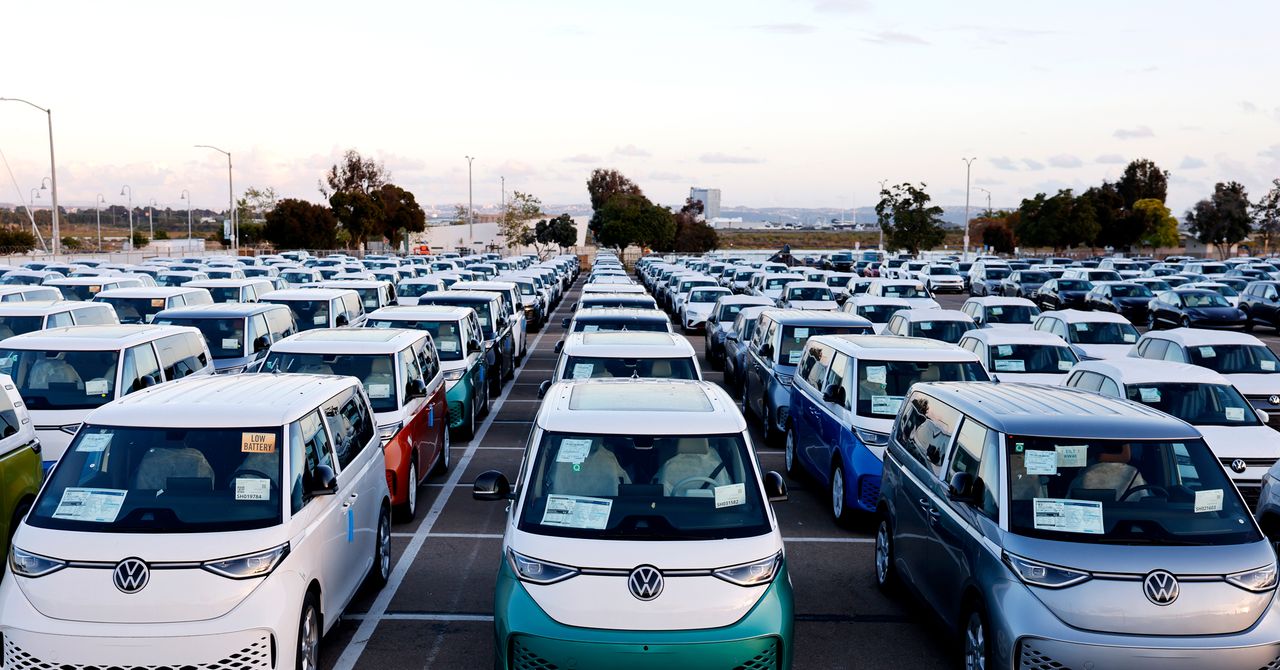Trump Wants to Kill California’s Emissions Standards. Here’s What That Means for EVs Leave a comment
This week the White Home and President Donald Trump tried to kill, as soon as and for all, California’s plan to speed up the sale of zero-emission automobiles and vehicles within the state. In a ceremony in Washington, DC, on Thursday attended by trucking executives, Trump signed three resolutions handed by Congress geared toward revoking California’s practically 60-year-old energy to set its personal motorized vehicle emissions guidelines.
In doing so, the federal authorities is taking purpose at some of the formidable car electrification schemes—and local weather insurance policies—on the earth: California’s objective to ban the sale of latest gas-powered automobiles within the state by 2035. The state, together with 10 others which have pledged to comply with its extra aggressive emissions guidelines, accounts for practically a 3rd of the US’s new automobile gross sales every year, giving it huge energy to dictate the nation’s automotive market. Immediately, one in 4 automobiles bought in California are both battery-electric or plug-in hybrid automobiles.
The transfer gained’t have an effect on the types of automobiles obtainable in showrooms and on tons at this time, and even subsequent yr, consultants say. However the try to revoke California’s powers, together with a set of different insurance policies geared toward electrical automobiles—together with the Environmental Safety Company’s bid to roll again car gas financial system requirements, Congress’ push to nix EV tax credit, and the Transportation Division’s pause on funding for nationwide EV charging infrastructure—might have an effect on automobile consumers’ curiosity in going electrical. In different phrases: The electrical vibes are unhealthy.
Auto “manufacturing selections are baked in and take years to alter,” says Cara Horowitz, the manager director of the Emmett Institute on Local weather Change and the Atmosphere at UCLA College of Legislation. “But when there’s a sense amongst shoppers a couple of loss in [electric vehicle] momentum, that may very well be felt out there.”
“This can be a large, large headwind,” says Simon Mui, who manages clear car coverage advocacy on the Pure Assets Protection Council.
California instantly responded Thursday with a lawsuit. Governor Gavin Newsom additionally instructed state companies to seek out new methods to advertise zero-emission automobiles within the state.
The resolutions are based mostly on a novel authorized concept put ahead by Republican lawmakers that they’ll use congressional energy normally utilized to federal company guidelines to dispose of California’s “waiver” authority, which was established in 1967 as a part of the landmark Clear Air Act. These waivers give the state a novel energy to set its personal stricter car emission requirements.
“It is a fully unprecedented strategy,” says California lawyer common Rob Bonta in an interview. The Trump administration “tries to mainstream these fringe theories, or simply these fully legally inappropriate theories, to attempt to do issues that they really cannot do.”
Ten different states, together with Colorado, Massachusetts, New York, and Washington, joined the lawsuit.
The altering form of the US electrical car market appears to have already had some impact on consumers’ attitudes towards battery-powered automobiles. Gross sales knowledge exhibits that whereas Individuals are nonetheless shopping for electrical, the speed of development has slowed. These sentiments, plus altering rules and tariff insurance policies, have led to “unprecedented” ranges of “havoc” for automakers, in accordance with a report launched final week by Financial institution of America analysts. “The following 4+ years would be the most unsure and risky time in product technique ever,” they wrote. Analysts famous that mannequin years 2026 by way of 2029 will see automakers launch simply 159 new US fashions, at a decrease annual common than the 20 years earlier.

